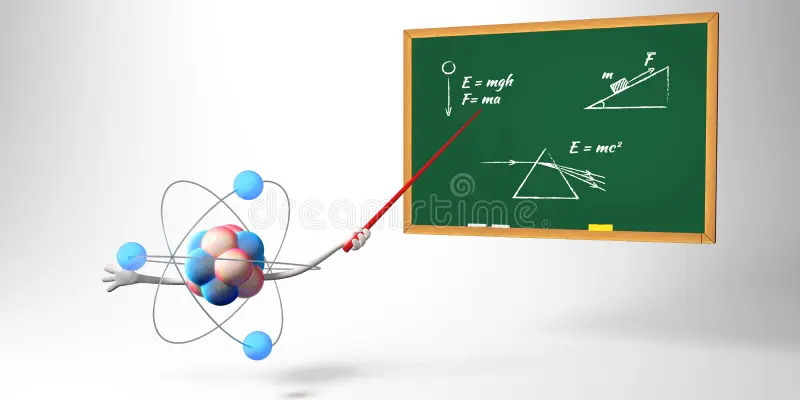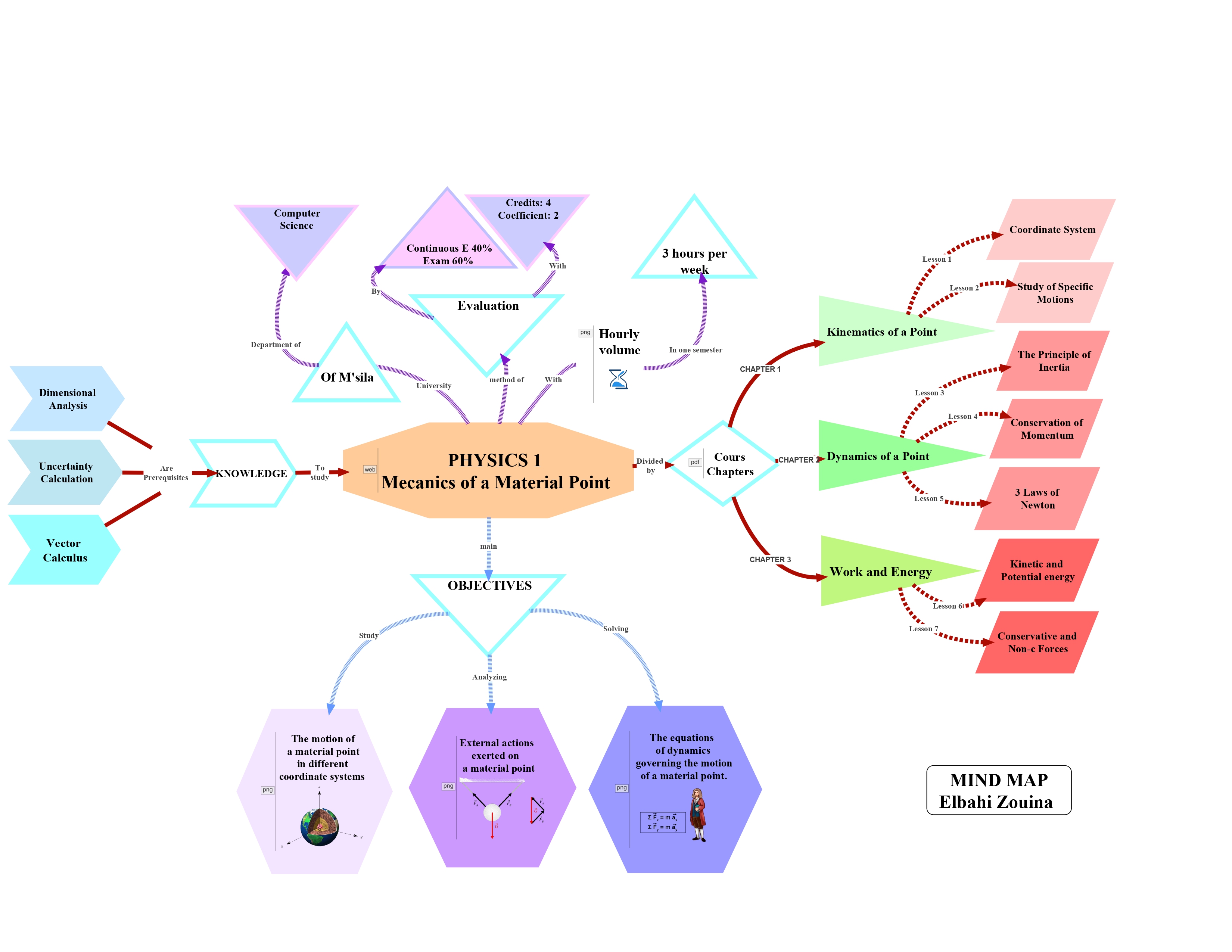Physics1/MI/2024/2025/Elbahi Z
Aperçu des sections
-

This page compiles a series of lectures and Tutorials on the mechanics of a material point. It is intended for first-year computer science students in the LMD system and can serve as a support for a course taught to students.
The mechanics of a material point is a foundational topic in classical physics, focusing on the behavior of objects when treated as point masses—entities with mass but no physical dimensions. This simplification allows for the exploration of fundamental principles governing motion and force in a clear and precise manner. In Physics 1, the study of these principles forms the basis for understanding more complex physical systems.
This course begins with an examination of kinematics, where the motion of a material point is described without considering the forces that cause it. Following this, the focus shifts to dynamics, which introduces the forces responsible for changes in motion, providing a deeper understanding of how and why objects move. The final component addresses work and energy, exploring the relationships between forces and the energy transformations that occur during motion. Together, these topics provide a comprehensive introduction to the mechanics of a material point, establishing the essential groundwork for further study in physics and related disciplines.
-

University: Mohamed BOUDIAF of M’Sila
Faculty: Mathematics and Computer Science
Department: Computer Science
Academic Year: 2024/2025
Target Audience: First year students in Computer Science Licence’s (Bachelor's) degree program.
Semester: 1
Subject: Physics 1 (Mechanics of a MaterialL Point)
Teaching Unit: Discovery (UED)
Total Hours: 42h (Lectures: 1h30, Tutorials: 1h30)
Duration: 14 weeks
Credits: 4
Coefficient: 2
Schedule: Refer to the timetable on the notice board or on the university website.
· Lectures: Tuesday from 14:00 AM - 17:00 PM
· Tutorials: Monday, Tuesday, Wednesday 08:00 AM - 12:30 PM
Rooms:
· Lectures: Amphi 3
· Tutorials: Room 32, 33, 34, 35, 36
Lectures and Tutorials: Z. ELBAHI
Contact: Via email at zouina.elbahi@gmail.com
Availability: Professors Hall: Tuesday, from 11:00 AM - 14:00 PM
Forum Response: Any course-related questions should be posted on the dedicated forum so that everyone can benefit from my response. I commit to answering questions posted within 72 hours.
Email: I commit to responding to emails within 72 hours of receiving them, except in unforeseen circumstances. Please note that the preferred communication channel is the forum; email is reserved for "urgent" matters (e.g., issues accessing the platform) and should be used judiciously.
-

-

At the end of this course, the student will have acquired scientific skills related to:
Understanding the assumptions of classical mechanics,
Isolating an object assimilable to a material point,
Describing and writing the motion of a material point in different coordinate systems,
Understanding and being able to calculate the velocities and accelerations of a mobile for any trajectory,
Describing, writing, and analyzing external actions exerted on a material point,
Understanding, writing, and solving the equations of dynamics governing the motion of a material point.
The calculation of work and energy in simple situations;
The application of conservation principles in mechanics.
-
The final evaluation consists of:
- A final exam, covering everything you have learned in the course during the semester, which counts for 60% of the final grade.
- Continuous and regular assessment, accounting for the remaining 40%, allows you to earn points throughout the semester.
- The average of written test scores,
- Grades obtained in individual and group work,
- The average score of TD (directed work) assessments.

-
-
Chat
-
Forum
-
Google Meet™ for Moodle
-
-

- The analysis and algebra of secondary education.
Vectors:Basic Operations: Understand vector operations including addition, subtraction, dot product, cross product, and double cross product.
Representation: Represent vectors both graphically and algebraically.
Advanced Operations: Know the gradient, divergence, and curl of vector fields.
Coordinate Systems:
Plane Coordinates: Understand Cartesian and polar coordinates.
Space Coordinates: Understand cylindrical and spherical coordinates.
Transformations: Perform transformations between different coordinate systems.
-

Chapter 1: Kinematics of a material point
1. Rectilinear motion - Movement in space
2. Study of particular movements
3. Study of movements in different systems (polar, cylindrical, and spherical)
Chapter 2: Dynamics of a material point.
1. The principle of inertia and Galilean reference frames
2. The principle of conservation of momentum
3. Newtonian definition of force (3 laws of Newton) - Some force laws
Chapter 3: Work and energy in the case of a material point.
1. Kinetic energy - Gravitational and elastic potential energy.
2. Force field - Non-conservative forces.
-

-
Google Meet™ for Moodle
-

-


